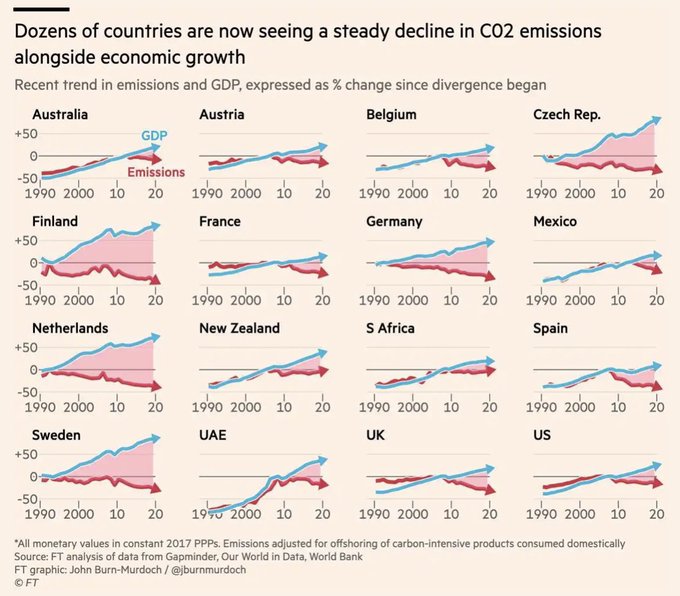There were recent comments by the COP28 President in UAE denying climate science around fossil fuels, hence, no need to transition from the same; but no credible support for his claims?
These talking points are very common across right wing media for ageing and less educated voters to support fossil fuel right wing policies, often with ‘Koch Network’ in the background, but simply promoting deflection and conspiracies?
In 2022 Burn-Murdoch showed in Financial Times how following economics makes for fast transition from fossil fuels & carbon emissions to renewable sources, result? Lower emission and higher economic growth.
‘FT Opinion Data Points Economics may take us to net zero all on its own. The plummeting cost of low-carbon energy has already allowed many countries to decouple economic growth from emissions’

‘COP28 president is wrong – science clearly shows fossil fuels must go (and fast)
Associate Professor in Energy Systems, UCL
According to the president of COP28, the latest round of UN climate negotiations in the United Arab Emirates, there is “no science” indicating that phasing out fossil fuels is necessary to restrict global heating to 1.5°C.
President Sultan Al Jaber is wrong. There is a wealth of scientific evidence demonstrating that a fossil fuel phase-out will be essential for reining in the greenhouse gas emissions driving climate change. I know because I have published some of it.
Back in 2021, just before the COP26 climate summit in Glasgow, my colleagues and I published a paper in Nature entitled Unextractable fossil fuels in a 1.5°C world. It argued that 90% of the world’s coal and around 60% of its oil and gas needed to remain underground if humanity is to have any chance of meeting the Paris agreement’s temperature goals.
Crucially, our research also highlighted that the production of oil and gas needed to start declining immediately (from 2020), at around 3% each year until 2050.
This assessment was based on a clear understanding that the production and use of fossil fuels, as the primary cause of CO₂ emissions (90%), needs to be reduced in order to stop further heating. The Intergovernmental Panel on Climate Change (IPCC) says that net zero CO₂ emissions will only be reached globally in the early 2050s, and warming stabilised at 1.5°C, if a shift away from fossil fuels to low-carbon energy sources begins immediately.
If global emissions and fossil fuel burning continue at their current rates, this warming level will be breached by 2030.
Since the publication of our Nature paper, scientists have modelled hundreds of scenarios to explore the world’s options for limiting warming to 1.5°C. Many feature in the latest report by the IPCC. Here is what they tell us about the necessary scale of a fossil fuel phase-out.
Fossil fuel use must fall fast
A recent paper led by atmospheric scientist Ploy Achakulwisut took a detailed look at existing scenarios for limiting warming to 1.5°C. For pathways consistent with 1.5°C, coal, oil and gas supply must decline by 95%, 62% and 42% respectively, between 2020 and 2050.
However, many of these pathways assume rates of carbon capture and storage and carbon dioxide removal that are likely to be greater than what could be feasibly achieved. Filtering out these scenarios shows that gas actually needs to be eliminated twice as fast, declining by 84% in 2050 relative to 2020 levels. Coal and oil would also see larger declines: 99% and 70% respectively.
In fact, oil and gas may need to be eliminated even quicker than that. A study by energy economist Greg Muttitt showed that many of the pathways used in the most recent IPCC report assume coal can be phased out in developing countries faster than is realistic, considering the speed of history’s most rapid energy transitions. A more feasible scenario would oblige developed countries in particular to get off oil and gas faster.
A fair and orderly transition
The International Energy Agency (IEA) has added to evidence in favour of phasing out fossil fuels by concluding that there is no need to license and exploit new oil and gas fields, first in a 2021 report and again this year.
This latest IEA analysis also estimates that existing oil and gas fields would need to wind down their production by 2.5% a year on average to 2030, accelerating to 5% a year from 2030 (and 7.5% for gas between 2030-40).
A separate analysis of the IPCC’s scenarios for holding global warming at 1.5°C came to the same conclusion. Since no new fields need to be brought into development, global production of oil and gas should be falling.
A fair and orderly transition
The International Energy Agency (IEA) has added to evidence in favour of phasing out fossil fuels by concluding that there is no need to license and exploit new oil and gas fields, first in a 2021 report and again this year.
This latest IEA analysis also estimates that existing oil and gas fields would need to wind down their production by 2.5% a year on average to 2030, accelerating to 5% a year from 2030 (and 7.5% for gas between 2030-40).
A separate analysis of the IPCC’s scenarios for holding global warming at 1.5°C came to the same conclusion. Since no new fields need to be brought into development, global production of oil and gas should be falling.’
For more related articles and blogs on Climate Change, Economics, Environment, Fossil Fuel Pollution, Koch Network, Political Strategy and Science Literacy click through:
Environment – Fossil Fuels – Climate Science Denial – Populationism – Anti-Immigration – Far Right – Tanton Network
Jeff Sparrow in Overland rebuts a counter critique of his book ‘Crimes Against Nature’ by a faux expert Edward Smith who appears to be au faire with faux environmental and anti-immigrant arguments promoted by the US Tanton Network linked NGO Sustainable Population Australia.
One would not bother using high level analysis to rebut low level faux science nativist agitprop inspired by former ZPG Zero Population Growth types, namely deceased white nationalist John ‘passive eugenics’ Tanton whose colleague was Paul ‘Population Bomb’ Ehrlich, with support from the Rockefeller Bros., ‘limits to growth’ PR constructs promoted by Club of Rome and drawing on Malthus, Galton and Madison Grant.
Conspiracy of Denial – COVID-19 and Climate Science
Some would not be surprised with the doubts and confusion being created round the COVID-19 crisis, especially by those wanting all economic activity to continue and ignore the human costs.
However, much of this agitprop, astro-turfing and junk science used by non experts has much in common with the information, media and political techniques used by radical right libertarian think tanks funded by the fossil fuel sector and related media, to influence society on climate science to avoid constraints and preserve income streams, with some eugenics in the background.
Nativist Conservative MPs for Fossil Fuels versus Science, Education, Research, Analysis & Society
Interesting article from a science journalist at The Guardian on comments made about ‘woke’ science by the Tories in the UK at the Conservative Conference in ‘Science hasn’t gone ‘woke’ – the only people meddling with it are the Tories’ by Philip Ball.
However, this is neither unique to the UK Conservatives nor dissimilar elsewhere, but it is a long game strategy against grounded science, research and analysis, like Trojan horses to disrupt curricula and universities, why?
Climate Change Science Attitudes Australia and Koch in USA
Climate science or climate change denialism have been apparent for some decades since the 1970s with Koch Industries being central along with ‘big oil’ of Exxon Mobil etc. in funding through ‘Dark Money’ academia, research, think tanks, media, politicians and PR techniques to influence society. Now we see the results including wide-spread climate denialism, avoidance of environmental protections and negative media PR campaigns; meanwhile the roots of this strategy have become more transparent with legal action following.
